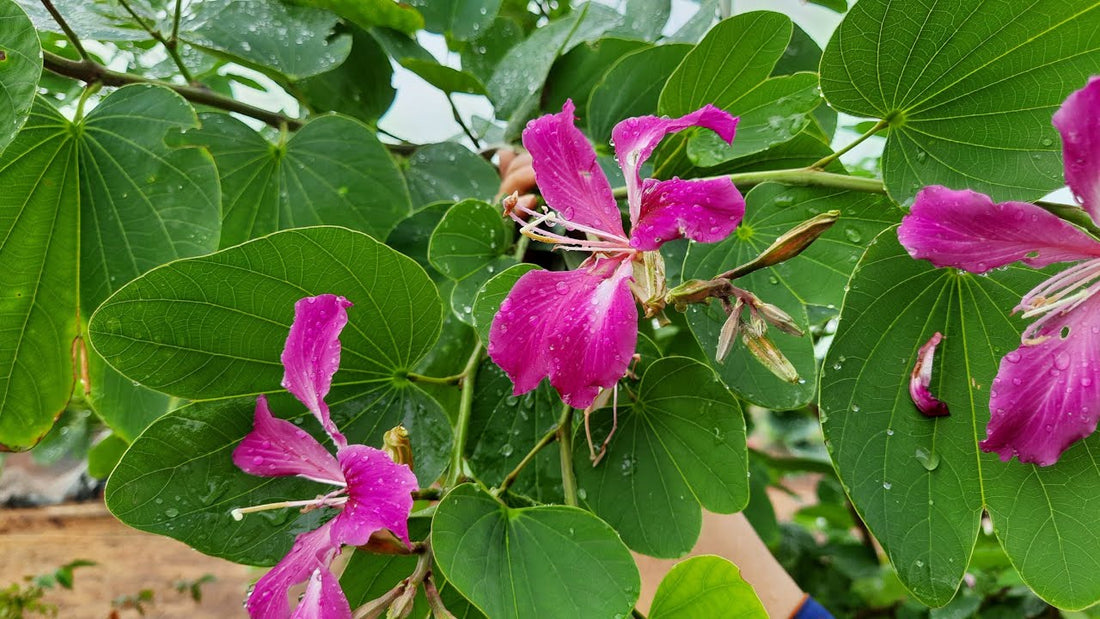

The Kanchan tree, admired for its ornamental beauty and practical uses, is a valuable asset in tropical and subtropical regions. It not only enhances landscapes but also provides vital ecological and economic benefits to communities. Botanical Marve Read more
Trending
Trees for Corporates
The Kanchan Tree: A Beacon of Beauty and Ecological Balance
The Kanchan tree, admired for its ornamental beauty and practical uses, is a valuable asset in tropical and subtropical regions. It not only enhances landscapes but also provides vital ecological and economic benefits to communities.
Botanical Marvel: The Kanchan tree, scientifically known as Bauhinia variegata, goes by several names in different parts of the world. In Hindi, it is commonly called "Kachnar", while in English, it is known as "Orchid Tree" due to its stunning, orchid-like flowers. In Tamil, it is referred to as "Mandarai". This deciduous tree can grow up to 50 feet tall, with striking white, pink, or purple flowers that bloom in spring. The Kanchan tree is not only admired for its aesthetic value but also for its adaptability to different soil types, making it a popular choice for ornamental planting.
Cultural Symbolism: The Kanchan tree holds cultural significance in many regions. In India, the tree's flowers are often used in religious ceremonies, and its bark and leaves are utilized in traditional medicine. The tree symbolizes grace and beauty, making it an integral part of gardens and public spaces.
Ecological Keystone: The Kanchan tree plays an important role in maintaining ecological balance. Its nitrogen-fixing roots help improve soil fertility, making it beneficial in agroforestry systems. Additionally, the tree's flowers attract pollinators such as bees and butterflies, contributing to local biodiversity and supporting ecosystems.
Versatile Uses: The Kanchan tree is highly versatile. Its bark, leaves, and flowers are used in traditional medicine to treat ailments such as skin diseases, ulcers, and digestive issues. The tree is also valued for its timber, which is used in the production of small-scale furniture and tools. Additionally, the young buds and flowers are consumed as a vegetable in some regions.
Economic Importance: The Kanchan tree provides economic value through its medicinal and timber products. Communities harvest its bark and leaves for sale in herbal markets, while its wood is used for making furniture and agricultural tools. The tree's ornamental value also boosts the local economy by attracting tourists to botanical gardens and public parks where Kanchan trees are planted.
Traditional Knowledge: Indigenous knowledge plays a crucial role in the sustainable use of the Kanchan tree. Local communities have long relied on the tree for its medicinal properties, using its various parts to treat common ailments. This traditional wisdom has been passed down through generations, helping to ensure that the Kanchan tree is utilized sustainably.
Environmental Sustainability: The Kanchan tree's ability to improve soil quality through nitrogen fixation makes it an important component of sustainable agricultural practices. By incorporating Kanchan trees into agroforestry systems, farmers can boost crop yields and protect soil health, contributing to environmental sustainability and increased biodiversity.
Challenges and Opportunities: The Kanchan tree faces challenges such as habitat destruction and unsustainable harvesting. However, these challenges also create opportunities for reforestation and conservation efforts. Promoting the planting of Kanchan trees in degraded areas can help restore ecosystems and provide economic benefits to local communities.
Community Empowerment: Empowering local communities to manage Kanchan trees sustainably can enhance livelihoods and promote ecological balance. Training programs focused on the cultivation and sustainable use of Kanchan products can provide economic opportunities while ensuring that the tree continues to thrive in its natural habitat.
Climate Resilience: The Kanchan tree is resilient in the face of climate change. Its ability to thrive in a variety of soil conditions and withstand periods of drought makes it a valuable resource for combating desertification and restoring degraded landscapes. By planting Kanchan trees in areas affected by climate change, communities can contribute to land restoration and climate adaptation efforts.
Consumer Awareness: Increasing consumer awareness about the benefits of Kanchan tree products can promote responsible consumption. By supporting sustainably sourced Kanchan wood, medicinal products, and ornamental plants, consumers can contribute to environmental conservation while supporting local communities.
Global Collaboration: Protecting and sustainably using the Kanchan tree requires collaboration between governments, NGOs, and local communities. International efforts focused on biodiversity conservation, sustainable forestry, and economic development are crucial to preserving the Kanchan tree for future generations.
Conclusion: The Kanchan tree represents a harmonious blend of beauty, sustainability, and economic potential. Its contributions to both ecosystems and communities highlight the importance of protecting and promoting this valuable species. By embracing sustainable practices and fostering collaboration, we can ensure the Kanchan tree continues to enrich landscapes and livelihoods for generations to come.
You may also like
Corporate Plantations
Most Popular
Connect with us
-
👥 Corporates
If you are looking for:
- 🌲 Tree Plantation Events
- 📊 CSR Projects
📧 corporate@growbilliontrees.com
📞 +91 9699723523
💬 +91 9325931304 WhatsApp (Only)
🕒 Mon - Sat | 10am - 7pm IST
-
🧩 Tree Plantation NGOs
If you are looking for:
- 💰 Financial Assistance
- 🤝 Operational Support
📧 support@growbilliontrees.com
📞 +91 9699723523
💬 +91 9325931304 WhatsApp (Only)
🕒 Mon - Sat | 10am - 7pm IST
-
🌼 Individuals
If you are looking for:
- 👥 Group Tree Plantation Drive
- 🌳 Bulk Tree Plantation
📞 +91 9699723523
💬 +91 9325931304 WhatsApp (Only)
🕒 Mon - Sat | 10am - 7pm IST





















